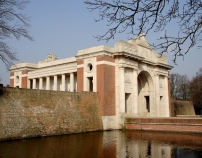| First Name: | Charles Frederic Noel Prince | Last Name: | SEALY | |
|---|---|---|---|---|
| Date of Death: | 24/05/1915 | Lived/Born In: | Brompton | |
| Rank: | Second Lieutenant | Unit: | Royal Fusiliers3 | |
| Memorial Site: | 1. South Kensington, St Luke 2. Menin Gate, Ypres | |||
Current Information:Age-23 6, Priory Grove, The Boltons, West Brompton
Battle of Bellewaarde (24th-25th May, 1915) The line held by V Corps of the BEF in May 1915, stretched 5 ½ miles around much of the Ypres salient from Hill 60 to the junction with the French at Turco Farm in the north-east and was held from right to left by 83 Brigade, 28th Division, 1st Cavalry Division (1 & 2 Cavalry Brigades astride the Menin Road), 85 Brigade, 28th Division (across the railway and the Zonnebeke road) and then 10 Brigade, 4th Division covering Wieltje and up to Mouse Trap Farm with 12 Brigade beyond. At 2.45am on 24th May, the Germans opened up a tremendous artillery bombardment on this front followed up by the release of gas in greater quantities than had been seen before with dense gas clouds rising to forty feet. In some places no-man’s land was very narrow and the defenders had little or no time in which to don their gas masks. The centre of the line held firm but at the two extremities, Mouse Trap farm in the north and Bellewaarde Lake in the south, the enemy broke through. Reserves were called up but despite some hard fighting the losses were not made good and the salient around Ypres was further reduced. On this day 85 Brigade of 28th Division held the front between Bellwaarde Lake and the Ypres-Zonnebeke road on the reverse slope of Verlorenhoek ridge. Half of the 3rd Royal Fusiliers and 7 Durham Light Infantry battalions were south of the railway whilst 2nd East Surrey and 8th Middlesex were north of it. The trenches were knee deep in mud after recent rain and this, along with the bombardment, caused them to collapse. Under this pressure, some troops fell back and this exposed the flank of 3rd Royal Fusiliers, themselves having to deal with the gas and the bombardment. The Germans tried exploiting the gap to the south and in response 3rd Royal Fusiliers sent half a company to cover its flank but by 8am, with most of their men by now casualties, they and 7th Durham Light Infantry were forced from their trenches. They moved back to their third line which they continued to hold all day before being relieved. The casualties for 3rd Royal Fusiliers on this day were a staggering 550 officers and mem. The records show that Charles Sealy served with the 7th Royal Fusiliers but as this battalion did not reach France until 1916, it is probable that he was attached to 3rd Royal Fusiliers. |
||||
| « Back to Search Results | ||||
| If you think any of the information shown here is incorrect, Click Here to submit your amends and comments | ||||




